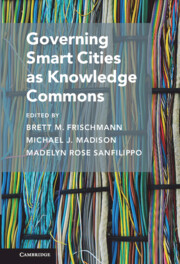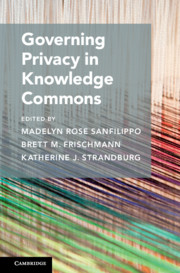30 results
Tables
-
- Book:
- Governing Smart Cities as Knowledge Commons
- Published online:
- 18 February 2023
- Print publication:
- 09 February 2023, pp ix-x
-
- Chapter
-
- You have access
- Open access
- HTML
- Export citation
7 - Technofuturism in Play
- from Part III - Private Influence on Decision-Making
-
-
- Book:
- Governing Smart Cities as Knowledge Commons
- Published online:
- 18 February 2023
- Print publication:
- 09 February 2023, pp 223-247
-
- Chapter
-
- You have access
- Open access
- HTML
- Export citation
Copyright page
-
- Book:
- Governing Smart Cities as Knowledge Commons
- Published online:
- 18 February 2023
- Print publication:
- 09 February 2023, pp iv-iv
-
- Chapter
-
- You have access
- Open access
- HTML
- Export citation

Governing Smart Cities as Knowledge Commons
-
- Published online:
- 18 February 2023
- Print publication:
- 09 February 2023
-
- Book
-
- You have access
- Open access
- Export citation
Figures
-
- Book:
- Governing Smart Cities as Knowledge Commons
- Published online:
- 18 February 2023
- Print publication:
- 09 February 2023, pp vii-viii
-
- Chapter
-
- You have access
- Open access
- HTML
- Export citation
Introduction
-
-
- Book:
- Governing Smart Cities as Knowledge Commons
- Published online:
- 18 February 2023
- Print publication:
- 09 February 2023, pp 1-5
-
- Chapter
-
- You have access
- Open access
- HTML
- Export citation
10 - A Proposal for Principled Decision-Making
- from Part IV - Lessons for Smart Cities
-
-
- Book:
- Governing Smart Cities as Knowledge Commons
- Published online:
- 18 February 2023
- Print publication:
- 09 February 2023, pp 295-308
-
- Chapter
-
- You have access
- Open access
- HTML
- Export citation
Contributors
-
- Book:
- Governing Smart Cities as Knowledge Commons
- Published online:
- 18 February 2023
- Print publication:
- 09 February 2023, pp xi-xii
-
- Chapter
-
- You have access
- Open access
- HTML
- Export citation
Contents
-
- Book:
- Governing Smart Cities as Knowledge Commons
- Published online:
- 18 February 2023
- Print publication:
- 09 February 2023, pp v-vi
-
- Chapter
-
- You have access
- Open access
- HTML
- Export citation
Part I - Social Dilemmas around Urban Data
-
- Book:
- Governing Smart Cities as Knowledge Commons
- Published online:
- 18 February 2023
- Print publication:
- 09 February 2023, pp 27-80
-
- Chapter
-
- You have access
- Open access
- HTML
- Export citation
Part II - Polycentricity and Urban Data
-
- Book:
- Governing Smart Cities as Knowledge Commons
- Published online:
- 18 February 2023
- Print publication:
- 09 February 2023, pp 81-220
-
- Chapter
-
- You have access
- Open access
- HTML
- Export citation
Conclusion
- from Part IV - Lessons for Smart Cities
-
-
- Book:
- Governing Smart Cities as Knowledge Commons
- Published online:
- 18 February 2023
- Print publication:
- 09 February 2023, pp 309-320
-
- Chapter
-
- You have access
- Open access
- HTML
- Export citation
1 - Smart Cities and Knowledge Commons
-
-
- Book:
- Governing Smart Cities as Knowledge Commons
- Published online:
- 18 February 2023
- Print publication:
- 09 February 2023, pp 6-26
-
- Chapter
-
- You have access
- Open access
- HTML
- Export citation
Part IV - Lessons for Smart Cities
-
- Book:
- Governing Smart Cities as Knowledge Commons
- Published online:
- 18 February 2023
- Print publication:
- 09 February 2023, pp 293-294
-
- Chapter
-
- You have access
- Open access
- HTML
- Export citation
Part III - Private Influence on Decision-Making
-
- Book:
- Governing Smart Cities as Knowledge Commons
- Published online:
- 18 February 2023
- Print publication:
- 09 February 2023, pp 221-292
-
- Chapter
-
- You have access
- Open access
- HTML
- Export citation

Governing Privacy in Knowledge Commons
-
- Published online:
- 29 March 2021
- Print publication:
- 25 March 2021
-
- Book
-
- You have access
- Open access
- Export citation
Part I - Personal Information as a Knowledge Commons Resource
-
- Book:
- Governing Privacy in Knowledge Commons
- Published online:
- 29 March 2021
- Print publication:
- 25 March 2021, pp 51-148
-
- Chapter
-
- You have access
- Open access
- HTML
- Export citation
5 - Public Facebook Groups for Political Activism
- from Part I - Personal Information as a Knowledge Commons Resource
-
-
- Book:
- Governing Privacy in Knowledge Commons
- Published online:
- 29 March 2021
- Print publication:
- 25 March 2021, pp 121-148
-
- Chapter
-
- You have access
- Open access
- HTML
- Export citation
Part III - Bringing Information Subjects into Commons Governance
-
- Book:
- Governing Privacy in Knowledge Commons
- Published online:
- 29 March 2021
- Print publication:
- 25 March 2021, pp 201-202
-
- Chapter
-
- You have access
- Open access
- HTML
- Export citation
Tables
-
- Book:
- Governing Privacy in Knowledge Commons
- Published online:
- 29 March 2021
- Print publication:
- 25 March 2021, pp viii-viii
-
- Chapter
-
- You have access
- Open access
- HTML
- Export citation



